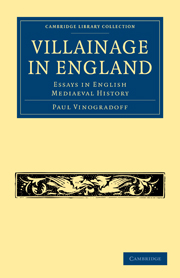Summary
A foreigner's attempt to treat of difficult and much disputed points of English history requires some justification. Why should a Russian scholar turn to the arduous study of English mediaeval documents? Can he say anything of sufficient general interest to warrant his exploration of so distant a field?
The first question is easier to answer than the second.
There are many reasons why we in Russia are especially keen to study what may be called social history — the economic development of nations, their class divisions and forms of co-operation. We are still living in surroundings created by the social revolution of the peasant emancipation; many of our elder contemporaries remember both the period of serfdom and the passage from it to modern life; some have taken part in the working out and putting into practice of the emancipating acts. Questions entirely surrendered to antiquarian research in the West of Europe are still topics of contemporary interest with us.
It is not only the civil progress of the peasantry that we have to notice, but the transformation and partial decay of the landed gentry, the indirect influence of the economic convulsions on politics, ideas, and morality, and, in a more special way, the influence of free competition on soil and people that had been fettered for ages, the passage from ‘natural husbandry’ to the money system, the substitution of rents for labour, above all, the working of communal institutions under the sway of the lord and in their modern free shape.
- Type
- Chapter
- Information
- Villainage in EnglandEssays in English Mediaeval History, pp. v - xPublisher: Cambridge University PressPrint publication year: 2010First published in: 1892

